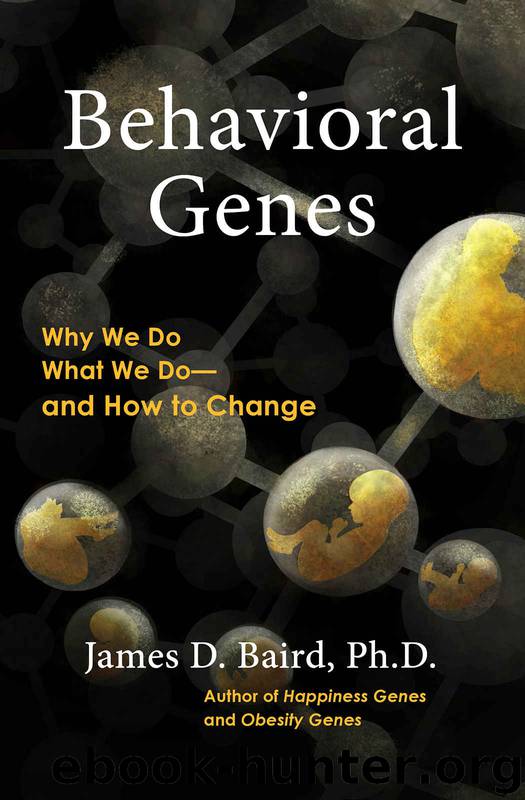Behavioral Genes: Why We Do What We Do and How to Change by James D. Baird

Author:James D. Baird [Baird, James D.]
Language: eng
Format: azw3
Published: 2015-02-28T16:00:00+00:00
Some observations about resolving prejudice and conflict
Conflict and prejudice have genetic roots. In an attempt to put a clamp on conflict and prejudicial behavior, societies have formed a variety of laws, but these work best within with tightly controlled areas. A certain level of conflict and prejudice might be acceptable to a local population in a small area. However as population density increases, such as in a large city, controlling conflict becomes a bigger problem. Anyone who has moved from a small town to a large city understands this fact well.
As human beings, our ancestral adaptations of conflict and prejudice are part of who we are. They are inherent in any separate groups, whether they are political, religious, or even philanthropic. Unfortunately, social scientists, evolutionary psychologists, neuroscientists, and so on have yet to come up with a practical way to even diminish this critical problem.
So far, the best we can do, at least in theory, is to make the goals of each group relatively the same. But of course, this requires that the members of one group work with and learn from members of the other group. Trying to do that sometimes add to misunderstandings. Besides, if two groups have the same goals, it might be more effective to merge them into one. However, since merging into a larger group dilutes the power of individual members, it rarely happens.
Download
This site does not store any files on its server. We only index and link to content provided by other sites. Please contact the content providers to delete copyright contents if any and email us, we'll remove relevant links or contents immediately.
| Fossils | Game Theory |
| Genetics | Molecular Biology |
| Organic | Paleontology |
Sapiens: A Brief History of Humankind by Yuval Noah Harari(14366)
Sapiens by Yuval Noah Harari(5365)
Pale Blue Dot by Carl Sagan(4996)
Homo Deus: A Brief History of Tomorrow by Yuval Noah Harari(4906)
Livewired by David Eagleman(3764)
Origin Story: A Big History of Everything by David Christian(3687)
Brief Answers to the Big Questions by Stephen Hawking(3428)
Inferior by Angela Saini(3311)
Origin Story by David Christian(3194)
Signature in the Cell: DNA and the Evidence for Intelligent Design by Stephen C. Meyer(3125)
The Gene: An Intimate History by Siddhartha Mukherjee(3093)
The Evolution of Beauty by Richard O. Prum(2992)
Aliens by Jim Al-Khalili(2827)
How The Mind Works by Steven Pinker(2813)
A Short History of Nearly Everything by Bryson Bill(2689)
Sex at Dawn: The Prehistoric Origins of Modern Sexuality by Ryan Christopher(2513)
From Bacteria to Bach and Back by Daniel C. Dennett(2481)
Endless Forms Most Beautiful by Sean B. Carroll(2473)
Who We Are and How We Got Here by David Reich(2431)
